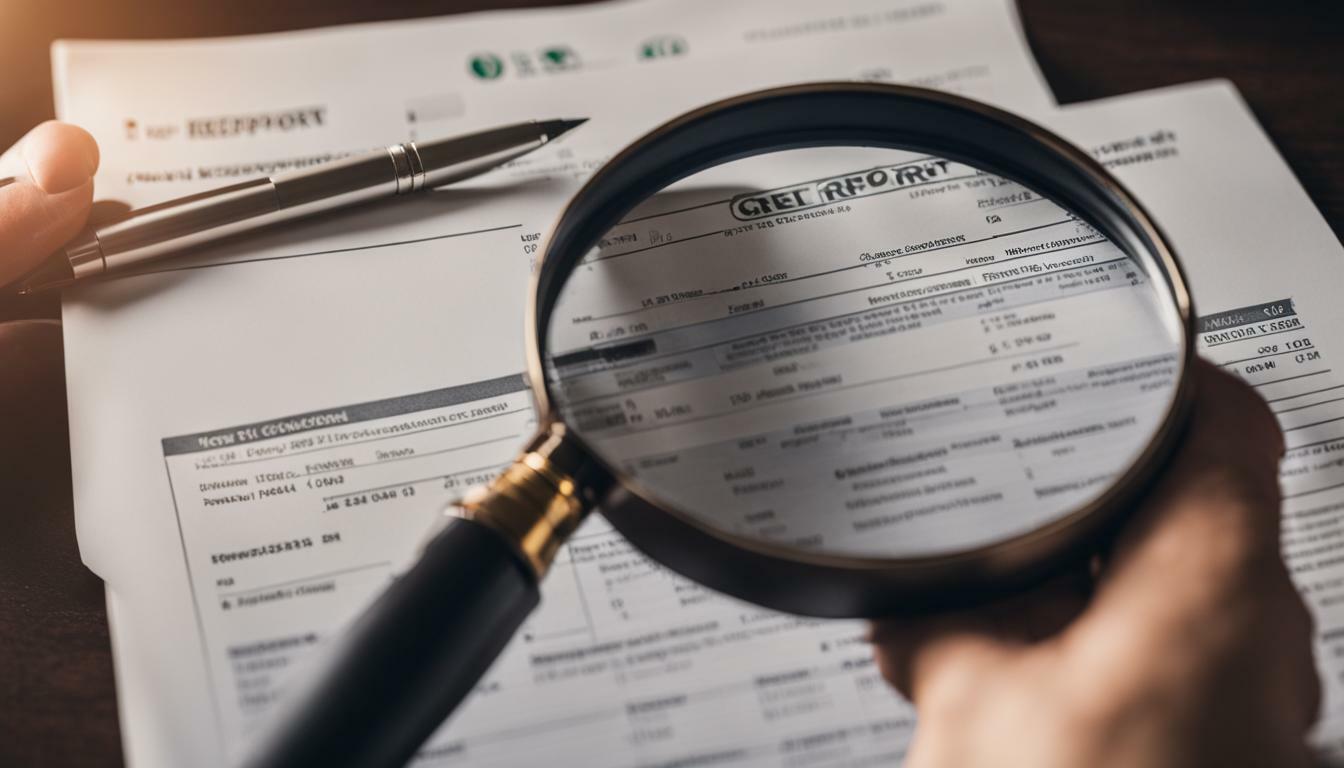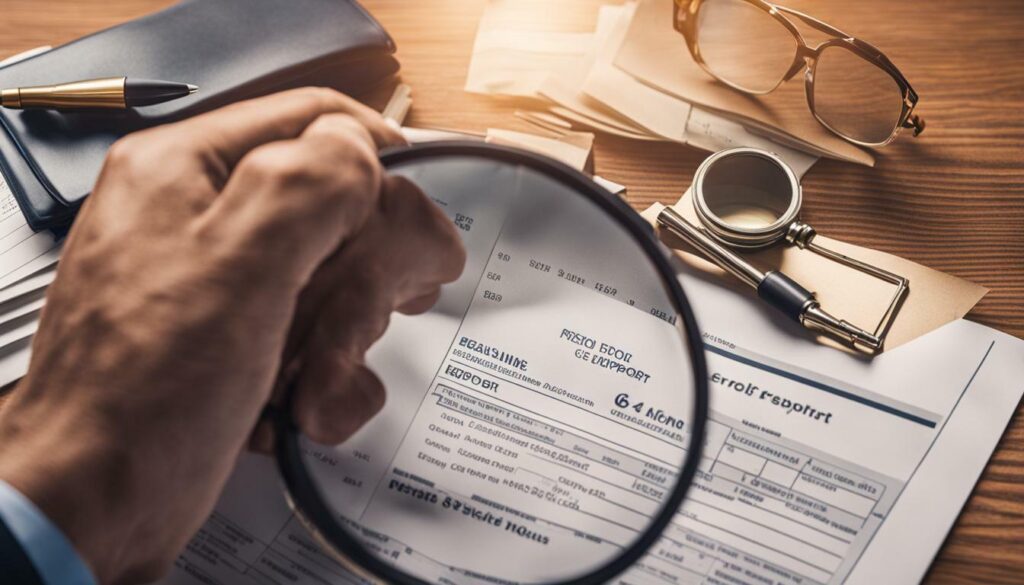Guide: How to Challenge Credit Report Inaccuracies Effectively

Discover the step-by-step process to effectively challenge credit report inaccuracies and protect your financial reputation in the U.S. Disputing errors on your credit reports is crucial if you find mistakes. Errors can occur due to incorrect information or fraud. When disputing errors, review the mistakes and gather supporting documents such as your credit report, bills, and identification information. Submit the dispute to the credit reporting company, either by phone, mail, or online. Clearly identify each mistake separately and request removal or correction. It’s advisable to send a copy of the dispute to the business or individual that provided the incorrect information.
Key Takeaways:
- Disputing errors on your credit reports is crucial for maintaining accuracy and protecting your financial reputation.
- Review the mistakes on your credit reports and gather supporting documents to strengthen your dispute.
- Clearly identify each mistake separately and request removal or correction in your dispute.
- Send a copy of the dispute to the business or individual that provided the incorrect information.
- Monitor your credit reports regularly and report any scams or fraudulent activities to the FTC.
Understanding the Dispute Process
To effectively challenge credit report inaccuracies, it’s crucial to understand the dispute process and follow specific steps. When you discover errors on your credit reports, it’s important to take action to correct them. Here is a guide on how to dispute credit report errors:
- Review the mistakes: Carefully go through your credit reports and identify any errors or inaccuracies. These could include incorrect personal information, accounts that don’t belong to you, or late payments that were reported incorrectly.
- Gather supporting documents: Collect any documentation that supports your claim and proves the errors on your credit reports. This may include copies of your credit report highlighting the mistakes, billing statements, and identification information.
- Submit the dispute: Contact the credit reporting company to initiate the dispute process. You can do this by phone, mail, or online, using the provided contact information. Clearly identify each mistake separately and explain why you believe it is inaccurate. Request the removal or correction of the errors.
It’s also advisable to send a copy of your dispute to the business or individual that provided the incorrect information. This will ensure that they are aware of the dispute and can investigate the matter from their end.
The credit reporting company has 30 calendar days (45 days in some cases) to investigate the dispute and notify you of the results. If the error is resolved, you should receive an updated credit report reflecting the changes. However, if you disagree with the results, you have the right to send a letter stating your disagreement and submit a complaint with the Consumer Financial Protection Bureau (CFPB).
Sample Letter to Dispute Errors:
Date
Your Name
Your Address
Credit Reporting Company Name
Credit Reporting Company Address
Subject: Dispute of Inaccurate Information on Credit Report
Dear Sir/Madam,
I am writing to dispute inaccurate information on my credit report that I believe is damaging my creditworthiness. After reviewing my credit report, I have identified the following errors:
- [Error 1]
- [Error 2]
- [Error 3]
I have attached copies of my credit report highlighting the errors, as well as supporting documentation that proves the inaccuracies. I kindly request that these errors be removed or corrected as soon as possible.
I have also sent a copy of this dispute letter to the business or individual that provided the incorrect information. I trust that they will also investigate the matter and cooperate with the necessary corrections.
Please provide me with updates on the investigation and notify me of the results within the required timeframe of 30 calendar days. If the errors are not resolved in this timeframe, I will be prepared to escalate the matter to the appropriate authorities.
Thank you for your prompt attention to this matter.
Sincerely,
Your Name
🚨 TUIC Errors + Low Credit Score?
CreditScoreIQ helps you build credit faster by reporting utility bills to all 3 bureaus—while you dispute errors.
Start Building Credit Today →

Ensure your dispute reaches the credit reporting company and relevant parties by following the recommended submission methods and contact guidelines. To initiate the dispute process, carefully review the errors on your credit report and gather supporting documentation, such as your credit report, bills, and identification information. This documentation will strengthen your case and provide necessary evidence.
Next, submit your dispute to the credit reporting company of concern. You have various options for submitting your dispute: through phone, mail, or online. When submitting your dispute, it is crucial to clearly identify each mistake separately and request removal or correction. This will help the credit reporting company understand which errors you are disputing and how they need to be addressed.
In addition to sending the dispute to the credit reporting company, it is advisable to send a copy of the dispute to the business or individual that provided the incorrect information. This will ensure that all relevant parties are aware of the dispute and can take appropriate action to investigate and rectify the errors. By contacting the business or individual directly, you increase your chances of resolving the inaccuracies in a timely manner.
For your convenience, here are the contact details for the major credit reporting companies:
| Company | Online Dispute | Mailing Address | Phone Number |
|---|---|---|---|
| Equifax | Online Dispute | Equifax Information Services LLC P.O. Box 740256 Atlanta, GA 30374-0256 |
1-866-349-5191 |
| Experian | Online Dispute | Experian P.O. Box 4500 Allen, TX 75013 |
1-888-397-3742 |
| TransUnion | Online Dispute | TransUnion LLC Consumer Dispute Center P.O. Box 2000 Chester, PA 19016 |
1-800-916-8800 |
Once your dispute is received, the credit reporting company will have 30 calendar days (or 45 days in some cases) to investigate your dispute and provide you with the results. If the error is corrected, an updated credit report will be sent to you. However, if you disagree with the results of the investigation, you have the right to send a letter stating your disagreement and submit a complaint with the Bureau. This will ensure that your dispute is properly escalated and reviewed.

Remember, it is essential to regularly monitor your credit reports for accuracy and report any scams or fraudulent activities to the Federal Trade Commission (FTC). By staying vigilant and taking proactive steps to protect your financial reputation, you can maintain accurate credit reports and secure your future financial well-being.
Understanding the Investigation and Your Rights
Gain insights into the investigation process and your rights when challenging credit report inaccuracies to ensure an effective resolution. Once you’ve submitted a dispute, the credit reporting company is required to investigate the error within 30 calendar days (or 45 days in some cases) and notify you of the results. This investigation involves reviewing the information provided by you and any relevant supporting documents.
During the investigation, the credit reporting company will contact the business or individual that provided the incorrect information to gather evidence and verify the accuracy of the disputed item. They will also analyze your credit report, looking for inconsistencies or discrepancies that may contribute to the error.
If the investigation concludes that the disputed information is inaccurate or incomplete, the credit reporting company will update your credit report accordingly. You should receive an updated copy of your credit report reflecting the corrections made. However, if the credit reporting company determines that the information is accurate, they will inform you of their decision and provide you with the details of your rights to dispute the accuracy of the item.
| Your Rights: | What to Do: |
|---|---|
| If you disagree with the results of the investigation: | Submit a letter stating your disagreement and provide any additional supporting documentation. |
| If the credit reporting company fails to resolve the dispute: | File a complaint with the Consumer Financial Protection Bureau (CFPB). |
It’s important to keep track of all communication and documentation related to your dispute, including copies of your letters, receipts, and other evidence. This will help provide a clear trail of your efforts to resolve the credit report inaccuracies and protect your rights as a consumer.

When disputing errors, be persistent and follow up regularly with the credit reporting company to ensure a timely resolution. Keep accurate records and document all communication to support your case in case further action is necessary.
Monitoring and Reporting Fraudulent Activities
Safeguard your financial future by actively monitoring your credit reports and promptly reporting any scams or fraudulent activities to the Federal Trade Commission (FTC). Fraudulent activities can include identity theft, unauthorized credit card charges, and other types of financial fraud. By staying vigilant and taking immediate action, you can protect yourself from potential financial harm.
Monitoring your credit reports is a crucial step in detecting and resolving fraudulent activities. Regularly check your credit reports from all three major credit reporting companies – Experian, TransUnion, and Equifax. Look for any unauthorized accounts, unfamiliar transactions, or suspicious activity that could indicate fraud. If you notice any discrepancies, it’s important to take action right away.
To report scams or fraudulent activities to the FTC, you can visit their official website at www.ftc.gov. The FTC is a government agency dedicated to protecting consumers from deceptive practices and scams. They provide resources and tools to help you report and recover from fraud. By reporting fraudulent activities, you not only protect yourself but also contribute to the fight against financial fraud.
Remember, prevention is key when it comes to protecting your financial reputation. Stay informed about the latest scams and fraud schemes, and never share personal or financial information with suspicious individuals or companies. By being proactive and staying vigilant, you can keep your financial future secure.

Conclusion
By following the step-by-step guide to challenging credit report inaccuracies, you can safeguard your financial reputation and secure a brighter future.
Disputing errors on your credit reports is crucial if you find mistakes. Errors can occur due to incorrect information or fraud. When disputing errors, review the mistakes and gather supporting documents such as your credit report, bills, and identification information. This will provide evidence to support your claim and increase the chances of a successful dispute.
Submit the dispute to the credit reporting company, either by phone, mail, or online. Clearly identify each mistake separately and request removal or correction. Be sure to include any relevant documentation and provide a detailed explanation of the error. It’s advisable to send a copy of the dispute to the business or individual that provided the incorrect information.
The credit reporting company has 30 calendar days (45 days in some cases) to investigate the dispute and notify you of the results. If the error is fixed, you’ll receive an updated credit report. However, if you disagree with the results, you can send a letter stating your disagreement and submit a complaint with the Bureau.
To contact the credit reporting companies, use the provided online links, mailing addresses, or phone numbers. They can assist you with any inquiries or issues you may have during the dispute process. Additionally, it’s important to monitor your credit reports for accuracy and report any scams or fraudulent activities to the Federal Trade Commission (FTC). This will help protect your financial reputation and ensure the integrity of your credit information.
By taking the necessary steps to challenge credit report inaccuracies, you are taking control of your financial future. Stay vigilant, keep track of your credit reports, and act promptly if you discover any errors. With a proactive approach, you can maintain accurate credit reports and enjoy the benefits of a strong financial standing.
FAQ
Q: Why is it important to dispute errors on my credit reports?
A: Disputing errors is crucial because inaccuracies can negatively impact your credit score and financial reputation. Correcting these errors ensures that your credit reports reflect accurate information.
Q: What should I do before disputing credit report errors?
A: Before disputing errors, review your credit report and gather supporting documents such as bills and identification information. This will help you provide evidence of the mistakes and support your dispute.
Q: How do I submit a dispute to the credit reporting company?
A: You can submit a dispute by phone, mail, or online. Clearly identify each mistake separately and request removal or correction.
Q: Should I notify the business or individual that provided the incorrect information?
A: Yes, it’s advisable to send a copy of the dispute to the business or individual that provided the incorrect information. This ensures that they are aware of the dispute and can also take corrective action.
Q: How long does the credit reporting company have to investigate the dispute?
A: The credit reporting company has 30 calendar days (45 days in some cases) to investigate the dispute and notify you of the results.
Q: What should I do if I disagree with the results of the investigation?
A: If you disagree with the results, you can send a letter stating your disagreement and submit a complaint with the Bureau. This ensures that your concerns are further reviewed and addressed.
Q: How can I contact the credit reporting companies?
A: You can contact the credit reporting companies using the provided online links, mailing addresses, or phone numbers. These contact details are available for your convenience.
Q: What should I do if the investigation doesn’t resolve my dispute?
A: If the investigation doesn’t resolve your dispute, you can take further action by following the steps outlined in the provided sample letter. This will guide you on the necessary actions to escalate your dispute and seek resolution.
Q: Why is it important to monitor my credit reports and report fraudulent activities?
A: Monitoring your credit reports helps you identify any inaccuracies or fraudulent activities. By reporting scams or fraudulent activities to the FTC, you contribute to safeguarding your financial well-being and preventing any potential damage.
Ready to Improve Your Credit?
Disputing TUIC errors is step one. Step two? Boost your score by reporting utility payments with CreditScoreIQ.
Get Started Now (Only $1 Trial) →3-bureau reporting • $1M identity insurance • Dark web monitoring




